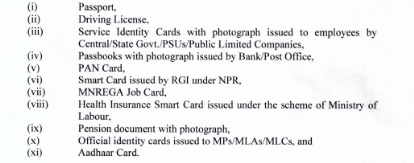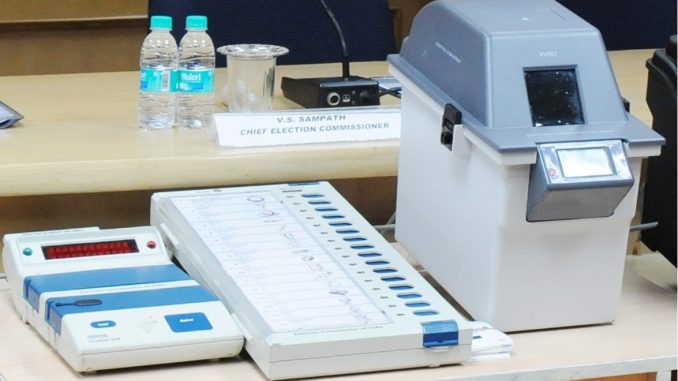The term of the present Lok Sabha will come to an end on June 3rd (04-06-2014 to 03-06-2019).
Hence the Election Commission of India has announced schedule of elections to the coming Lok Sabha elections 2019. With the announcement of elections, the model code of conduct will be applicable with immediate effect.
There are 28 parliamentary constituencies in Karnataka overall. Election will be conducted in two phases.
| Constituencies | Notification | Last date for submission | Scrutiny | Last day for withdrawal | Poll day | Counting day | |
| 2nd Phase | 14 | 19th March | 26th March | 27th March | 29th March | 18th April | 23rd May |
| 3rd Phase | 14 | 28th March | 4th April | 5th April | 8th April | 23rd April | 23rd May |
Electoral Rolls
The draft electoral rolls were published on 10th October in 198 constituencies; in the remaining 26 assembly constituencies where bye-elections were due, it was published on 10th November.
The Special Summary Revision of Electoral Rolls with reference to 01.01.2019 as the qualifying date, was taken up during November-December 2018, so as to ensure that all eligible but unenrolled citizens in the state were duly registered. Final publication of electoral rolls was on 16.01.2019, and is available on the website www.ceokarnataka.kar.nic.in.
Electors as per the final rolls 2019
| General | Service | Total | |
| Male | 2,54,55,976 | 38,735 | 2,54,94,711 |
| Female | 2,48,46,488 | 804 | 2,48,47,292 |
| Others | 4718 | 0 | 4718 |
| Total | 5,03,07,182 | 39,539 | 5,03,46,721 |
As per the instructions of the Election Commission, Karnataka will be migrating to the centralised Electoral Roll Management system, the ERO NET. The online portal for submission of applications www.voterreg.kar.nic.in has been closed, and will no longer be available for the public. Any person willing to submit online application form has to do so through the national portal nvsp.in, w.e.f 1st March.
Photo Electoral Rolls
Photo Electoral Rolls will be used during this Lok Sabha Election and photo percentage in Photo Electoral Rolls of Karnataka is 99.93 percent.
Electors Photo Identity Cards (EPIC)
Identification of the voters at the polling booth at the time of poll shall be mandatory. Electors who have been provided with EPIC shall be identified through EPIC. Presently, EPIC coverage in Karnataka is 100 percent. After the publication of the draft rolls, a total of 14,15,956 EPIC cards have been generated, out of which 10,62,398 have been distributed. The remaining 3,53,558 is under distribution.
Alternative Documents
The Commission has vide its direction dated 28th February, notified 11 alternate photo ID cards to establish voter identity. If the voter’s name figures in the Electoral Rolls but he is not able to produce his Voter ID card, then he may produce any of the following photo ID cards to establish his identity

Photo Voter Slips (PVS) – No Longer a standalone identification document for voting To inform voters about the particular polling station where he/she is enrolled, and what his/her serial number is in the Electoral roll, the voter slip bearing the photo of the elector will be distributed at least seven days before the date of poll by the District Election Officer. Rigorous monitoring of the distribution process will be done by the DEO and General Observer concerned.
The Commission, in its instruction dated 28th February, has specified that the Photo Voter Slips shall not be accepted as a stand-alone identification document for voting.
Voter Guide
A Voter Guide (in Kannada / English) shall be handed over to every household ahead of the elections, giving information about the date and time of polls, contact details of the BLOs, helpline numbers etc. This guide will be distributed along with the Photo Voter Slips by the BLOs.
Assured Minimum Facilities (AMF) at Polling Stations
Karnataka had 54,265 polling stations in 2014. This has increased by seven percent now, to 58,186. The Commission has upgraded the status of facilities at polling stations from the earlier concept of Basic Minimum Facilities (BMF) to Assured Minimum Facilities (AMF). Accordingly, instructions have been issued to the Chief Electoral Officer to ensure that every polling station is equipped with drinking water , shed, toilet, ramp for the physically challenged voters, a standard voting compartment etc.
The Commission has issued instructions to ensure that as far as practicable, all polling stations are located at ground floor, and are provided with sturdy ramps, magnifying glass, sign interpreters and transport from home to polling booth and back. Further, the Commission has directed that all Persons with Disabilities (PwDs) in an assembly constituency are identified and tagged to their respective polling stations, and necessary disability-specific arrangements made for their smooth voting experience.
Voter Verifiable Paper Audit Trail (VVPATs)
EVMs and VVPATs shall be used in all polling stations to enhance the transparency and credibility of the election. The First Level Check of EVMs and VVPATs has been completed in the presence of representatives of political parties. A two-stage randomization of EVMs and VVPATs will also be done.

VVPAT with EVM. Pic: pib.nic.in
On pilot basis, VVPAT from one polling station in each assembly segment will be randomly selected by the Returning Officer by draw of lot in presence of all candidates, to count VVPAT paper slips for verification of the result obtained from the Control Unit. Thus, paper slip for one polling station in each assembly Segment will be counted for the election. The EVM transportation vehicles are all GIS-mapped so as to track the movement of these vehicles and machines.
Photographs of candidates on EVM ballot paper
To facilitate electors in identifying the candidates, the Commission has prescribed an additional measure of printing the photograph of candidate on the ballot to be displayed on the EVM (Ballot Unit) and on Postal Ballot Papers.
Ceiling of election expenses for candidates
The election expense ceiling for candidates has been revised by the Government of India vide Notification dated 28th February, 2014. As per the revised ceilings, the maximum limit of election expenses for the parliamentary constituencies is Rs 70 lakh per candidate.
New IT applications to be used:
(a) Voter Helpline 1950: All election related information, feedback, suggestions and complaints may be registered by the citizen by calling the toll free number.
(b) SUVIDHA: Single Window Permission System: A single window system for giving election-related permissions within 24 hours has been created. In this system, candidates and political parties can apply for permissions for meetings, vehicles, loudspeakers etc at a single location.
(c) cVIGIL: Model Code of Conduct violations can be reported by the citizen through the mobile application cVIGIL. Citizen can register complaints in the form of photos and videos, and the Election Commission ensures action within 100 minutes of registration of the complaint. The complaints are geo-tagged and time stamped, and the complainant can be anonymous.
(d) Chunavana Mobile App: This one-stop mobile application will help in all kinds of services rendered to the citizen. Citizen can search for the assembly constituency, check for names, navigate to the polling station, check the details of the polling station including the facilities and the contact details of the officers, book wheelchair or vehicle in case of PwD, get details of the candidates, queue status in an urban polling station, check the voter turnout and also the results on counting day.
E-Atlas
All the 58186 polling stations and parts of the state are mapped and is put in the public domain in the Karnataka Election Information System. The services of navigation and finding the assembly constituency is integrated with this mapping exercise.
The text is based on a press release from the Chief Electoral Officer, Karnataka
whether holiday on both 18 and 23 in Karnataka as in our village election is on 23. I am working in Bangalore.how can I vote?